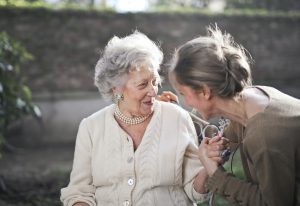COVID-19 is an infectious disease that is characterized by dry cough, fever, and fatigue. It is usually caused by SARS-CoV-2 coronavirus. Most of the people who suffer from this disease end up recovering even without receiving any treatment. Others become seriously sick and need intensive medical care. The people who are at risk of severe illness are older adults and people with underlying health conditions. That is why you need to be careful when taking care of an older adult suffering from COVID-19. Below are more details on how you should take care of such a person.
Help Cover Their Basic Needs
Just like other people, older people suffering from COVID-19 have basic needs that have to be met. For instance, they need to eat, put on clothes and sleep well. Therefore, as a caregiver, you need to ensure that the sick person eats and sleeps well. When shopping for foods, buy them fresh vegetables, fresh fruits, legumes, and unprocessed food. Eating these foods will help boost the patient’s immune system, helping them recover from COVID-19.
You should also encourage the patient to take at least eight cups of water every day. This water will transport nutrients throughout their body and regulate their body temperature. If they are not willing to drink too much water, encourage them to consume fruits and vegetables that contain water.
Ensure That They Take Their Medications
COVID-19 patients are often advised to take a few over-the-counter medicines that help manage COVID-19 symptoms. For instance, some of them are told to take medications that help reduce fever and cough syrups. Hiring in-home senior care would ensure that your patient takes all their medications.
While caring for this person, you should check whether the prescribed medications are helping improve the patient’s symptoms or not. If they are not improving, you should contact the patient’s doctor. You should also help the sick person follow any other instructions given by the doctor.
Monitor The Patient’s Symptoms
You should constantly monitor the symptoms that the sick elderly are experiencing. A home pulse oximeter can help you do that. This medical device measures the amount of oxygen in a person’s bloodstream. Therefore, it can help you know when your patient is experiencing difficulty in breathing. For instance, if it shows a reading of less than 92%, you should know that the patient is experiencing difficulty in breathing, and you should have them hospitalized. You should also have your patient hospitalized if they are experiencing emergency warning signs. These warning signs include:
- Bluish face or lips
- Blue, pale, or grey-colored nail beds, skin or lips
- Persistent chest pain
- Trouble breathing
- Confusion
Do Not Leave the Patient Alone
You may be tempted to go out and leave your patient alone after you notice that they are doing fine. However, you should not do that as the patient’s health condition may worsen after you go out. If you have to go out, request a good in-home senior care provider to take care of the sick person while you are away.
While spending time with the sick person, you should wear a face mask and encourage the sick person to wear a face mask. You should not touch your face mask while wearing it, and you should throw it away immediately after use. You should also ensure that you stay at least 6 feet away from this person.
Clean The Patient’s Personal Items
While caring for an older adult suffering from COVID-19, you should clean this patient’s personal items. For instance, you should wash their clothes and personal household items. You should use regular detergent to clean these items and warm water. You should wear disposable gloves while cleaning these items. After you are done cleaning them, remove the gloves and wash your hands with water and soap. You should place the dirty gloves in the waste bin kept in the sick person’s room. You should also clean the surfaces in your home that people often touch. These surfaces include tabletops, doorknobs, and counters.
COVID-19 is an infectious disease. That is why you need to be careful when caring for an elderly person suffering from this disease. You should ensure that this person takes their medications, eats well, and gets enough rest.

